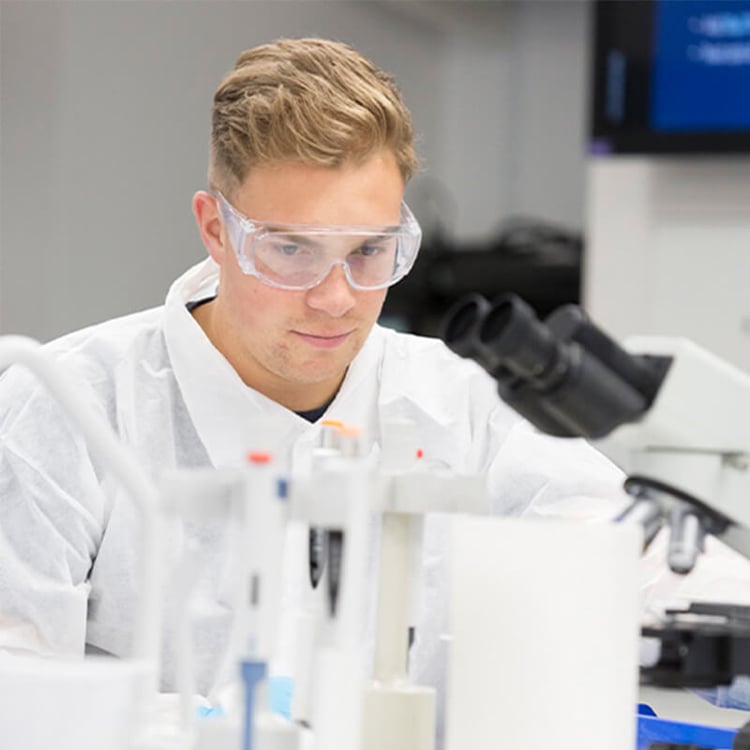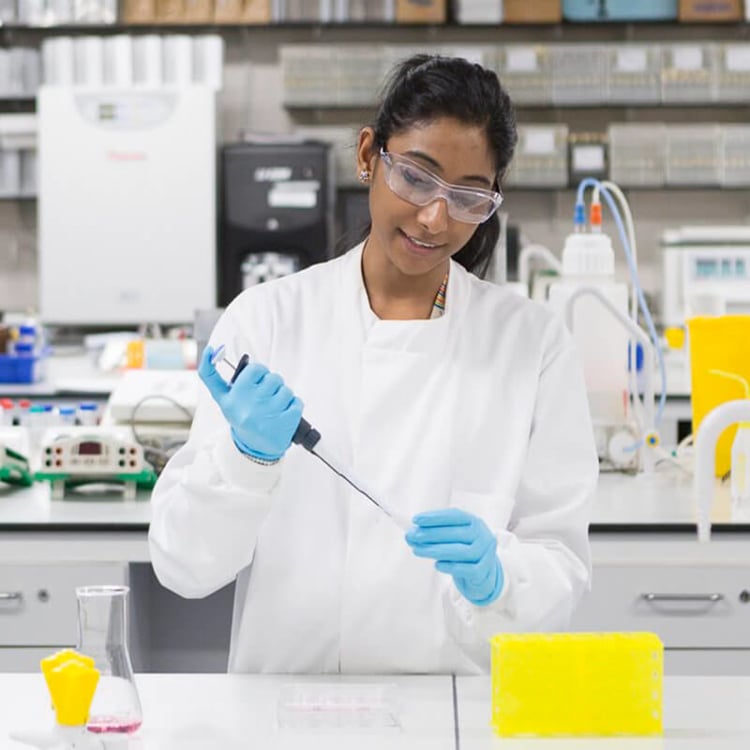/ Postgraduate Taught /
Start date:
September 2025
Duration:
1 year (full-time)
2 - 4 years (part-time)
Please add an additional year if undertaking the Professional Experience Year: integrated 2-year masters
Number of credits:
180 credits
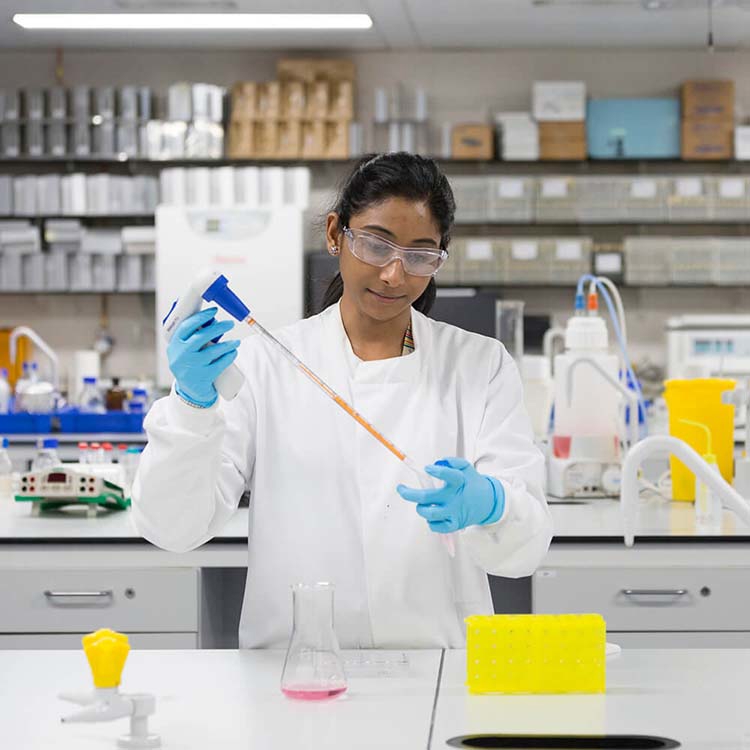
Postgraduate, Master's and Doctoral On Campus Open Day
Saturday 10 May 2025
Improving human health has never been a bigger global challenge. Get the specialist, practical skills you need to play a part in advancing our understanding of the brain and nervous system.
Did you know?
You will gain insight into recent advances in the field of clinical neuroscience of relevance to a wide range of neurological disorders and neurodegenerative diseases.
This programme is recognised by the Federation of European Neuroscience Societies (FENS) and included in the Network of European Neuroscience Schools (NENS), which is the highest accolade in European neuroscience teaching.
Modules
Module details: In this module, you will study the foundations of modern clinical neuroscience, exploring topics such as neurotransmission mechanisms, brain plasticity, and the role of Artificial Intelligence in medicine. You will gain an integrated overview of contemporary clinical neuroscience, using real-world examples and current theories, while understanding its links to molecular biology, genetics, pharmacology, and medical sciences.
Module details: In this module, you will study approaches to address the growing global burden of neurological diseases, focusing on individual, national, and international perspectives. You will explore biopsychology, neurology, and lifestyle medicine, with an emphasis on preventative strategies in clinical neuroscience. The module will also consider health inequities, cultural perspectives, and the “lived experience” of patients in research design and implementation.
Module details: In this module, you will study the rapidly evolving field of clinical neuroimmunology, exploring cutting-edge concepts such as the brain as an immune organ. You will delve into topics like neurodegeneration, neurogenesis, and the immune system's interaction with the central nervous system. The module will highlight the interdisciplinary nature of the field, including epigenetics, stem cell biology, brain repair, and regenerative medicine, informing clinical practice and therapeutic interventions.
Module details: In this module, you will develop critical thinking skills to interpret healthcare research effectively and apply it in nutrition practice. You will collect body composition data using methods commonly employed in healthcare settings, conduct data analysis, and evaluate the strengths and limitations of these techniques. This module will enhance your ability to assess research critically and apply data-driven insights to nutritional practice, preparing you for evidence-based decision-making in clinical and healthcare environments.
Module details: In this module, you will collect data for three research projects, designed to develop your skills and broaden your knowledge. With lecturer-led guidance, you will engage in data collection and analysis, enhancing your research capabilities. You will select one project to present as both a scientific paper and a poster, strengthening your ability to communicate research findings effectively. This module will equip you with essential research skills, preparing you for evidence-based practice and scientific dissemination in nutrition and health.
These modules are those we currently offer and may be subject to change.
Professional Experience Year
This course also offers the option of a Professional Experience Year. This programme combines dynamic career modules with flexible placement opportunities. After completing your first year of study, you'll then complete a full year of Professional Experience training as part of your degree. This will give you real career experience. This unique opportunity offers you distinct paths to build your expertise.
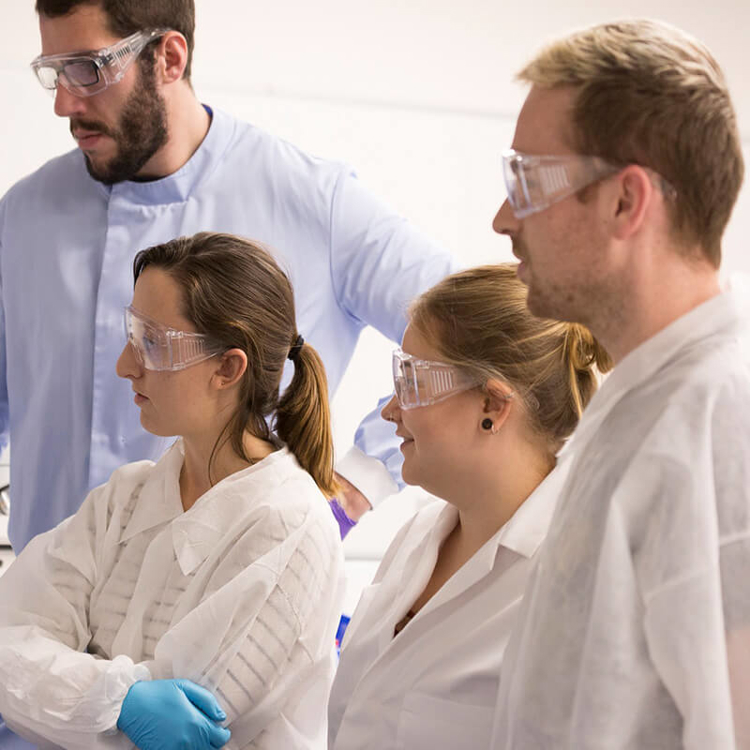
Skills
Make a difference to human lives with a postgraduate degree in Clinical Neuroscience.
The Roehampton master’s in Clinical Neuroscience (MSc) will help you develop your interest in neuroscience by gaining the specialist skills needed to be a leader in your field.
By focusing on important insights into recent advances in neurosciences of relevance to neurological and neuropsychiatric diseases, you’ll become a confident, agile, independent thinker, with the ability to adapt rapidly to change.
You’ll graduate with the knowledge and skills to:
- Develop a detailed understanding of modern theory and concepts relating to brain research and neuroscience
- Learn the application of these principles in the treatment of brain disorders
- Understand the emphasis on the clinical relevance of recent developments in neuroscience.
- Develop your research methods skills through learning applied neuroscience with a research project
- Expand your data handling and analysis skills
- Learn applied theory and statistics
Learning
Learn in a stimulating environment.
The Roehampton MSc Clinical Neuroscience covers topics ranging from fundamental aspects of cellular signalling and function at a molecular level, to psychophysiological and systems levels approaches to clinical conditions. The programme provides important insights into current developments in neuroscience research in topics such as depression, traumatic brain injury, motor neurone disease, and dementia.
For your studies you will have the opportunity to work in our state-of-the-art laboratories, with modules covering topics such as:
- Neurobiological mechanisms of human brain disorders
- Effects of nutrition and diet on brain health and function
- The gut-brain axis and the bidirectional communication between the central and the enteric nervous system
- The use of Artificial Intelligence (AI) in clinical neuroscience
- Ethical issues in clinical neuroscience and healthcare
- Research methods
You’ll work with academics who are currently investigating a range of topic issues such as:
- Links between immune response and lifestyle/living conditions (psychoneuroimmunology)
- The role of bioactive lipids in nutritional psychiatry
- Effects of preterm birth on later life brain function
- Understanding neuroimmune responses in brain repair or brain cancer
- The mechanisms of brain cell death and repair using neural stem cells
Careers
Shape the future of public health.
With a Roehampton Clinical Neuroscience masters, you can go onto a wide range of careers, including:
- Healthcare (public sector, private commercial or independent)
- Pharmaceutical industry
- Academia research/teaching
- Commercial research
- Medical writing
- Local and central government (roles in policy and health promotion)
In addition, many students are already health professionals and study the course as part of their career development and specialisation.
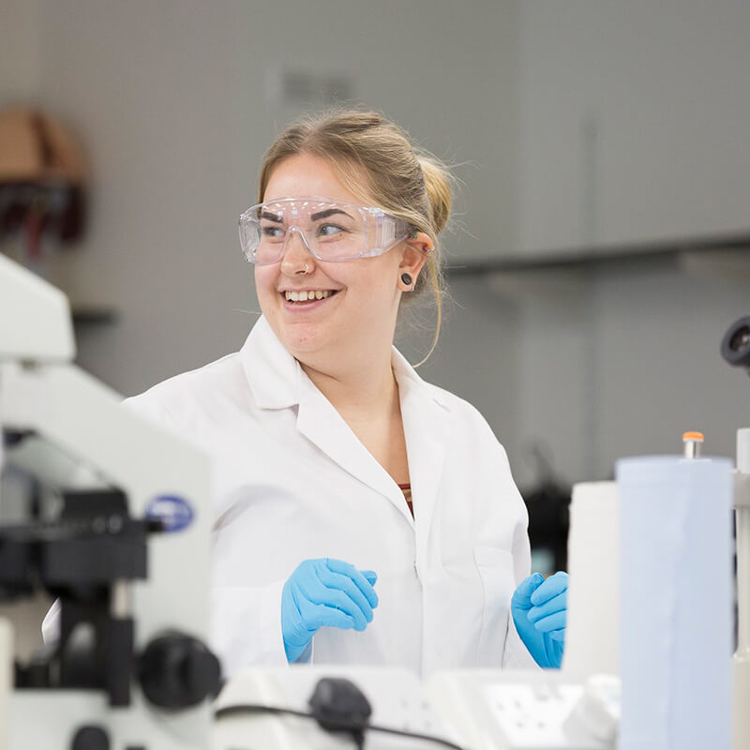
Our careers team is available to support you from the start of your studies until after you graduate. We will help you build your CV, prepare for interviews, and meet and learn from successful graduates working at the top of their careers. You’ll also have opportunities to work with our partners across London and beyond, and to attend a Roehampton jobs fair where you can find out about graduate opportunities and meet employers.
Open days
Get a real taste of our campus, community and what it’s like to study at Roehampton
Applying
UK postgraduate students apply through our direct application system.
Course subject to curriculum review and validation.
Specific entry requirements
Applicants should have a UK 1st, 2:1 or 2:2, or international equivalent in a relevant subject.
Relevant subjects include: all Biological and Health Sciences (e.g. biology, health, Biomedical sciences), Medicine, Medical Sciences, Psychology, Pharmacy and Neuroscience.
In addition, healthcare professionals with substantial vocational experience would be considered even if they fell just below the criteria above.
General entry requirements
September 2024 entry tuition fees (UK)
| Level of study | Full-time | Part-time* |
| MSc | £11,250 Professional Experience Year: £2,500 |
£5,625 |
*Year 1 fee
We offer a wide range of scholarships and bursaries. See our financial support pages for UK students.
We also provide other ways to support the cost of living, including free buses and on-campus car parking, hardship support and some of the most affordable student accommodation and catering in London. Find out more about how we can support you.
International postgraduate students apply through our direct application system.
Course subject to curriculum review and validation.
Specific entry requirements
Applicants should have a UK 1st, 2:1 or 2:2, or international equivalent in a relevant subject.
Relevant subjects include: all Biological and Health Sciences (e.g. biology, health, Biomedical sciences), Medicine, Medical Sciences, Psychology, Pharmacy and Neuroscience.
In addition, healthcare professionals with substantial vocational experience would be considered even if they fell just below the criteria above.
General entry requirements
September 2025 entry tuition fees (international)
| Level of study | Full-time | Part-time* |
| MSc | £18,250 Professional Experience Year: £2,500 |
£9,125 |
*Year 1 fee
We offer a wide range of scholarships and bursaries. See our financial support pages for international students.
We also provide other ways to support the cost of living, including free buses and on-campus car parking, hardship support and some of the most affordable student accommodation and catering in London. Find out more about how we can support you.




